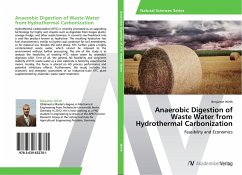Hydrothermal carbonization (HTC) is recently promoted as an upgrading technology for highly wet streams such as digestate from biogas plants, sewage sludge, and other waste biomass. It converts raw feedstock into a coal-like product known as hydrochar. The resulting hydrochar has fuel characteristics similar to lignite coal; potential for soil amendment, or for material use. Besides the solid phase, HTC further yields a highly contaminated waste water, which cannot be released to the environment without further processing. The aim of this study is to analyze the feasibility of treating HTC waste water by anaerobic digestion (AD). First of all, the general AD feasibility and long-term stability of HTC waste water as a sole substrate is tested by experimental means. Hereby, the focus is placed on AD process performance and potential inhibitory effects. Furthermore, the study includes the economic and energetic assessment of an industrial-scale HTC plant supplemented by anaerobic waste water treatment.
Bitte wählen Sie Ihr Anliegen aus.
Rechnungen
Retourenschein anfordern
Bestellstatus
Storno

